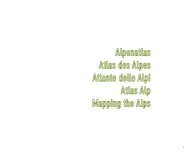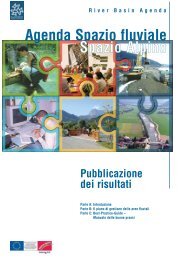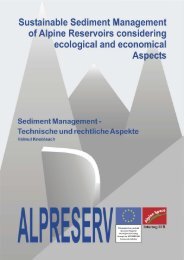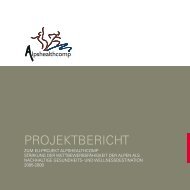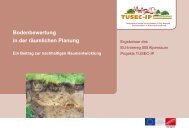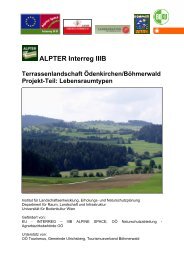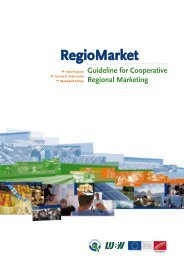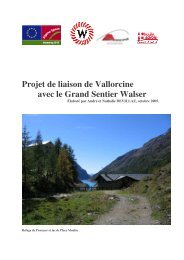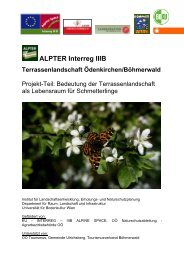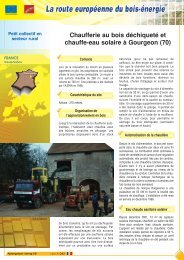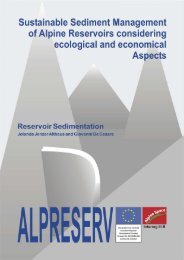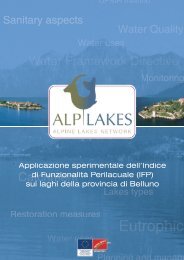WALSERSPRACHE - The four main objectives of the Alpine Space ...
WALSERSPRACHE - The four main objectives of the Alpine Space ...
WALSERSPRACHE - The four main objectives of the Alpine Space ...
You also want an ePaper? Increase the reach of your titles
YUMPU automatically turns print PDFs into web optimized ePapers that Google loves.
Kurt Wanner<br />
also an afterthought about <strong>the</strong> origin and development path <strong>of</strong> a language. <strong>The</strong>y elicit right<br />
away a question: why have <strong>the</strong>y come about only at <strong>the</strong> end <strong>of</strong> <strong>the</strong> 20 th century to record <strong>the</strong>se<br />
languages? When one looks closely at <strong>the</strong>se facts, one soon realises <strong>the</strong>re is a lot more riding<br />
on <strong>the</strong>m than mere language conservation. Here, at <strong>the</strong>ir best, comes to light a political and<br />
cultural distinctiveness, since a language is <strong>the</strong> backbone <strong>of</strong> a country whose unique way <strong>of</strong><br />
life is endangered or straightaway lost. Or, as Ina-Maria Greverus put it, «Confronted with <strong>the</strong><br />
devastation <strong>of</strong> our world, <strong>the</strong> dialect is <strong>the</strong> only medium still capable <strong>of</strong> housing a niche we<br />
can call fa<strong>the</strong>rland». Goe<strong>the</strong> expressed it so aptly 200 years ago when he declared that a<br />
dialect is «<strong>the</strong> component from which our soul gets its breath». Unfortunately we cannot ascertain<br />
what has prompted <strong>the</strong> editors <strong>of</strong> our ten dictionaries to undertake year- or even decadelong<br />
work to compile <strong>the</strong>m. <strong>The</strong> recently departed French movie director Roger Planchon once<br />
stated that humanity needed <strong>the</strong>se compilations about <strong>the</strong> old cultural heritage as a form <strong>of</strong><br />
“security”, because it was afraid in <strong>the</strong> 21 st century it would ei<strong>the</strong>r crumple or disappear altoge<strong>the</strong>r:<br />
«<strong>The</strong>refore we must be able to tell ourselves: here, over thousands <strong>of</strong> years we have<br />
accomplished wondrous things. This is <strong>the</strong> pessimistic flip side. <strong>The</strong> optimistic one goes somewhat<br />
like this: we store everything to draw up a balance sheet on which we can later on and<br />
o<strong>the</strong>rwise build up something again and have a fresh start». Did our dictionary compilers,<br />
who were quite likely <strong>the</strong> last to be able to do what <strong>the</strong>y did, ga<strong>the</strong>r and interpret lengthy word<br />
lists because <strong>the</strong>y were afraid <strong>the</strong>ir languages could soon fade away? Or did <strong>the</strong>y ra<strong>the</strong>r bear<br />
through <strong>the</strong>ir laboursome undertakings in order to be able to have a fresh start? Probably a<br />
bit <strong>of</strong> both. Is dialect <strong>the</strong> secret idiom <strong>of</strong> a minority? We must not overlook an important aspect:<br />
dictionaries are not canned languages. <strong>The</strong>y ra<strong>the</strong>r bear witness to steady changes and language<br />
tolerance. <strong>The</strong>re have been influences from Italian, French and Rhaetoromanic which<br />
left a permanent imprint and never once <strong>the</strong> doubt crossed <strong>the</strong> minds <strong>of</strong> our forefa<strong>the</strong>rs that<br />
by so doing <strong>the</strong>ir language was being given away, threatened or alienated. Quite <strong>the</strong> opposite.<br />
Foreign expressions bespoke an enrichment and made it possible to better get along with<br />
neighbours. When today we finger through <strong>the</strong>se Walser dictionaries we get time and again<br />
<strong>the</strong> impression <strong>the</strong>y were <strong>the</strong> secret language <strong>of</strong> an alpine minority who did not want outsiders<br />
to get even one word <strong>of</strong> what was being said. A language which, under political or<br />
social pressure, could work as a reliable secret code, something like Rotwelsh for Gipsies or<br />
Yiddish for Eastern Jews. This applies to Walsers only to an extremely small extent. It has<br />
instead to do a lot more with <strong>the</strong> age <strong>of</strong> this language and to <strong>the</strong> isolation <strong>of</strong> many villages<br />
until recently. Fernand Braudel, an historian, rightly said: «On <strong>the</strong> highlands one can still<br />
find images <strong>of</strong> days long bygone well preserved, tools and working ways, dialects, clothing,<br />
superstitions, in short, whatever grew <strong>of</strong> age and became something, survives up <strong>the</strong>re, where<br />
new ways and manners will never take <strong>the</strong> upperhand». If this had not been so it would no<br />
longer have been possible to compile <strong>the</strong>se dictionaries in our day and age. <strong>The</strong> special circumstances<br />
surrounding <strong>the</strong> lives <strong>of</strong> South Walsers. If one plans to pay a visit to Walser areas<br />
in Piedmont and in <strong>the</strong> Aosta Valley <strong>the</strong>re is no better way to get ready than by reading Emil<br />
Balmers’ «<strong>The</strong> Walsers in Piedmont», which appeared in 1949. It is not exactly a guidebook,<br />
113



